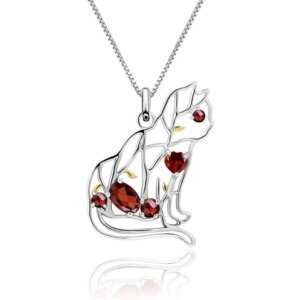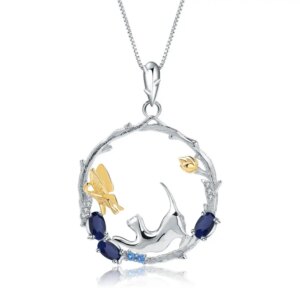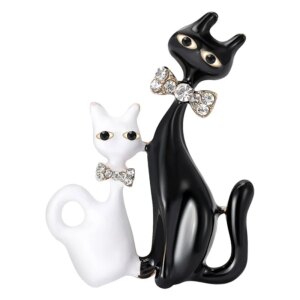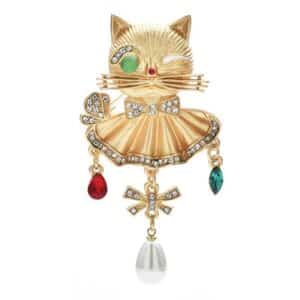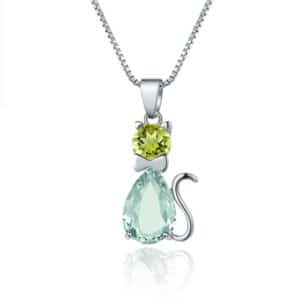Cats with worms can suffer from various health issues, including weight loss, diarrhea, and anemia. This article will guide you through the common types of worms that can infect cats, their symptoms, and the best treatment and prevention methods. By the end, you’ll have a comprehensive understanding of how to keep your feline friend healthy and worm-free. At Cat Karma Creations, we understand the importance of a healthy and happy cat, and we offer a range of cat-themed jewelry and gifts to celebrate your furry friend.
Cats with Worms: Common Types of Worms in Cats
Roundworms
Roundworms, scientifically known as Toxocara cati and Toxascaris leonina, are one of the most common parasites found in cats. These worms can grow up to several inches long and resemble spaghetti. Cats can become infected by ingesting infected eggs or larvae, which can be present in soil, contaminated food, or even in the mother’s milk. Roundworms can cause significant health problems, especially in kittens, leading to malnutrition, stunted growth, and even death if left untreated. At Cat Karma Creations, we believe in the importance of a healthy lifestyle for your cat, and we offer a variety of cat-themed jewelry to celebrate their well-being.
Tapeworms
Tapeworms, specifically Dipylidium caninum, are another common parasite in cats. These segmented worms can grow up to several inches long and are typically transmitted through the ingestion of infected fleas or other intermediate hosts. Once inside the cat, the tapeworm attaches to the intestinal wall and can cause symptoms such as weight loss, diarrhea, and the presence of rice-like segments in the feces. Regular flea control is essential in preventing tapeworm infections. Our Paw Print Charm Bracelet is a beautiful way to show your love for your cat and support their health.
Hookworms
Hookworms, including Ancylostoma tubaeforme and Ancylostoma braziliense, are small, blood-sucking parasites that attach to the intestinal wall of cats. Cats can become infected by ingesting larvae from contaminated soil or through direct skin penetration. Hookworms can cause severe anemia, weight loss, and diarrhea, particularly in kittens. Early detection and treatment are crucial to prevent serious health complications. At Cat Karma Creations, we offer a range of Exquisite Silver Cat Earrings to celebrate the beauty of your cat and their health.
Whipworms
Whipworms, Trichuris trichiura, are less common in cats but can still cause significant health issues. These worms are characterized by their whip-like shape and can infect cats through the ingestion of larvae from contaminated soil or food. Symptoms of whipworm infection include weight loss, anemia, and diarrhea. Regular deworming and maintaining a clean environment are essential in preventing whipworm infections. Our Lovely Peridot Crystal Cat Necklace is a perfect gift for any cat lover and a symbol of your commitment to their health.
Cats with Worms: Symptoms of Worm Infections in Cats
General Symptoms
The symptoms of worm infections in cats can vary depending on the type and severity of the infestation. Common general symptoms include weight loss, diarrhea, vomiting, and a pot-bellied appearance. Cats may also appear lethargic and have a poor appetite. If you notice any of these signs in your cat, it is important to consult a veterinarian for a proper diagnosis and treatment plan. At Cat Karma Creations, we understand the importance of a healthy cat, and we offer a variety of cat-themed jewelry to celebrate their well-being.
Specific Symptoms for Each Type of Worm
Roundworms: Cats with roundworms may exhibit symptoms such as vomiting, diarrhea, weight loss, and a pot-bellied appearance. In severe cases, kittens may experience stunted growth and respiratory issues.
Tapeworms: Tapeworms can cause rice-like segments to appear in the cat’s feces or around the anal area. Other symptoms include weight loss, diarrhea, and a generally poor appearance.
Hookworms: Hookworms can lead to severe anemia, weight loss, and diarrhea. Cats may also show signs of lethargy and poor coat condition. In kittens, hookworm infections can be particularly dangerous and may lead to death if left untreated.
Whipworms: Whipworms can cause weight loss, anemia, and diarrhea. Cats may also experience abdominal pain and a general lack of energy. Regular deworming and maintaining a clean environment are essential in preventing whipworm infections.
Cats with Worms: Treatment Options for Cats with Worms
Oral Deworming Medications
Oral deworming medications are the most common and effective treatment for cats with worms. These medications, such as pyrantel pamoate, fenbendazole, and praziquantel, are available in both over-the-counter and prescription forms. It is important to follow the instructions provided by your veterinarian or the medication’s label to ensure proper dosage and administration. Regular follow-up treatments may be necessary to completely eliminate the infection. At Cat Karma Creations, we offer a range of Stylish Cat Lover Necklaces to show your support for your cat’s health and well-being.
Topical Treatments
Topical treatments, such as spot-on medications, can also be used to treat and prevent worm infections in cats. These products, which are applied to the cat’s skin, typically contain ingredients that kill or repel parasites. Some popular topical treatments include selamectin and imidacloprid. It is important to follow the application instructions carefully and to use these products in conjunction with oral deworming medications for the best results. Our Elegant Amethyst Bird Earrings are a beautiful way to celebrate the unique bond between you and your cat.
Home Remedies and Natural Solutions
While home remedies and natural solutions can be used as complementary treatments, they should not replace veterinary care. Some natural remedies, such as pumpkin seeds, garlic, and diatomaceous earth, have been suggested to have deworming properties. However, their effectiveness is not scientifically proven, and they may not be sufficient to treat severe infections. Always consult with your veterinarian before using any home remedies to ensure they are safe and appropriate for your cat. At Cat Karma Creations, we believe in the power of natural beauty and offer a variety of Elegant Cat Brooches to celebrate the natural beauty of your cat.
Cats with Worms: Preventing Worm Infections in Cats
Regular Deworming Schedule
Regular deworming is essential for maintaining a cat’s health and preventing worm infections. The frequency of deworming can vary depending on the cat’s age, lifestyle, and risk of exposure. Kittens should be dewormed every two weeks from the age of three weeks until they are three months old. Adult cats should be dewormed at least twice a year, or more frequently if they are at higher risk. Your veterinarian can provide a customized deworming schedule based on your cat’s specific needs. At Cat Karma Creations, we offer a range of Charming Cat Brooches to show your love for your cat and support their health.
Maintaining a Clean Environment
Maintaining a clean environment is crucial in preventing worm infections. Regularly clean your cat’s litter box and dispose of feces promptly to reduce the risk of contamination. Wash your hands thoroughly after handling your cat or cleaning the litter box. Vacuum your home regularly to remove any eggs or larvae that may be present in carpets and furniture. Keeping your home clean and hygienic can significantly reduce the risk of worm infections. At Cat Karma Creations, we believe in the importance of a clean and healthy environment for your cat, and we offer a variety of cat-themed jewelry to celebrate their well-being.
Flea Control and Hygiene Practices
Flea control is an important aspect of preventing tapeworm infections in cats. Use flea control products, such as spot-on treatments, collars, and sprays, to keep your cat free from fleas. Regularly comb your cat’s fur to remove any fleas or flea eggs. In addition to flea control, maintain good hygiene practices by washing your cat’s bedding and toys regularly. This will help create a clean and healthy environment for your cat. At Cat Karma Creations, we offer a range of Silver Cat Earrings to celebrate the unique bond between you and your cat.
Dietary Recommendations
A balanced and nutritious diet can support your cat’s immune system and help prevent worm infections. Feed your cat a high-quality, commercially prepared cat food that meets their nutritional needs. Avoid feeding raw meat or unpasteurized dairy products, as these can increase the risk of parasitic infections. Consider adding supplements, such as probiotics and omega-3 fatty acids, to your cat’s diet to support their overall health and well-being. At Cat Karma Creations, we believe in the importance of a healthy diet for your cat, and we offer a variety of Stylish Cat Lover Necklaces to celebrate their health and well-being.
| Feature | Roundworms | Tapeworms | Hookworms | Whipworms |
|---|---|---|---|---|
| Transmission | Ingestion of infected eggs or larvae | Ingestion of infected fleas or other hosts | Ingestion of larvae or penetration through skin | Ingestion of larvae or contaminated soil |
| Symptoms | Vomiting, diarrhea, weight loss | Rice-like segments in feces, weight loss | Anemia, weight loss, diarrhea | Weight loss, anemia, diarrhea |
| Treatment | Oral deworming medications | Oral deworming medications | Oral deworming medications | Oral deworming medications |
| Prevention | Regular deworming, hygiene | Flea control, regular deworming | Regular deworming, hygiene | Regular deworming, hygiene |
- Regular deworming is essential for maintaining a cat’s health and preventing worm infections.
- Understanding the lifecycle of common cat worms helps in effective prevention and treatment.
- Maintaining a clean environment and regular hygiene practices reduces the risk of worm infections.
- Regular vet check-ups are crucial for early detection and treatment of worm infections.
- Dietary changes and supplements can support a cat’s immune system and help prevent worm infections.
- Educating cat owners about the signs and symptoms of worm infections empowers them to take timely action.
Popular Quote
“A cat has absolute emotional honesty; human beings, for one reason or another, may hide their feelings, but a cat does not.”
— Ernest Hemingway
Statistical Fact
According to the American Veterinary Medical Association (AVMA), approximately 45% of cats in the United States have some form of intestinal parasite. This statistic underscores the importance of regular deworming and preventive measures to ensure your cat’s health. (Source: AVMA, 2021)
Three Tips for Preventing Worm Infections in Cats
- Regular Deworming: Follow a consistent deworming schedule recommended by your veterinarian to prevent and treat worm infections effectively.
- Maintain a Clean Environment: Regularly clean your cat’s litter box, vacuum your home, and wash your hands to reduce the risk of contamination.
- Flea Control: Use flea control products and maintain good hygiene practices to prevent tapeworm infections.
Popular Questions About Cats with Worms
- What are the most common types of worms in cats?
The most common types of worms in cats include roundworms, tapeworms, hookworms, and whipworms. - How can I tell if my cat has worms?
Common symptoms of worm infections in cats include weight loss, diarrhea, vomiting, and a pot-bellied appearance. If you notice any of these signs, consult your veterinarian. - How often should I deworm my cat?
Kittens should be dewormed every two weeks from the age of three weeks until they are three months old. Adult cats should be dewormed at least twice a year, or more frequently if they are at higher risk. - Can humans get worms from their cats?
Yes, some types of worms, such as roundworms, can be transmitted from cats to humans. Regular deworming and hygiene practices can help prevent this. - What is the best way to prevent worm infections in cats?
The best way to prevent worm infections is through regular deworming, maintaining a clean environment, and using flea control products.
Final Thoughts About Cats with Worms
Cats with worms can face significant health challenges, but with the right knowledge and care, you can prevent and treat these infections effectively. Regular deworming, hygiene, and vet check-ups are key to keeping your cat healthy and happy. If you suspect your cat has worms, consult your veterinarian for the best course of action. Visit our website Cat Karma Creations to find excellent gifts for cat lovers and follow us on social media for more tips and updates. You can also contact us at (800) 343-1604 or info@catkarmacreations.com for more information or custom orders.


